Implementation Toolkit Assists Companies with DEI Progress
Published Nov 10, 2022 by A.J. Mistretta
A total of 120 companies participated in Houston’s first Regional Equity & Inclusion Assessment in 2021, establishing a baseline for where companies stood on a set of 15 key DEI benchmarks. The assessment is based on the Global DEI Benchmarks and provides an internal roadmap for DEI planning and progress. Through the Partnership’s One Houston Together efforts, we will conduct the assessment again in 2023 to offer companies an opportunity to gauge their individual progress and to learn how the business community is collectively progressing on DEI.
As companies prepare to complete the assessment this spring, Partnership member and global consulting firm Accenture worked with One Houston Together to create an Implementation Toolkit to support organizational progress. The toolkit focuses on 7 of the 15 DEI benchmarks and includes a set of 20 recommendations to drive strategy and attract and retain people.
Foundation: Drive the Strategy
1. Vision
2. Leadership
3. Structure
Internal: Attract & Retain People
4. Recruitment
5. Benefits
6. Compensation
7. Flexibility
During the November One Houston Together Talent Roundtable, Tiffany Wallace with Accenture Strategy & Consulting presented the toolkit and discussed how it can be used to help companies determine areas of focus.
The collaboration with One Houston Together and creation of the toolkit is part of Accenture’s social impact work, which also includes the development of apprenticeship programs and working to prepare students for the jobs of the future to address the anticipated talent gap and skills shortage.
“Accenture is committed to building more opportunities for more people and fostering a culture of equality internally and within local communities,” Wallace said.
Accenture is also partnering with local historically black colleges and universities to create pathways for students into the field of technology to address the lack of Black talent in the sector.
Wallace said DEI progress is often slow, even among more progressive organizations. “For Accenture it wasn’t a quick and easy journey,” she said. “I joined Accenture in 2014 and I can honestly say that I feel l can bring my true self to work each and every day. I see diversity around me every day which wasn’t the case when I first joined.”
View highlights of the toolkit here. The 2023 Houston Region Equity & Inclusion Assessment will be open from April 1-June 1, 2023. Data from January 1-December 31, 2022 should be used to complete the assessment. View the assessment questions in this fillable PDF and review findings from the 2021 assessment here.
 The Houston Report
The Houston Report




















